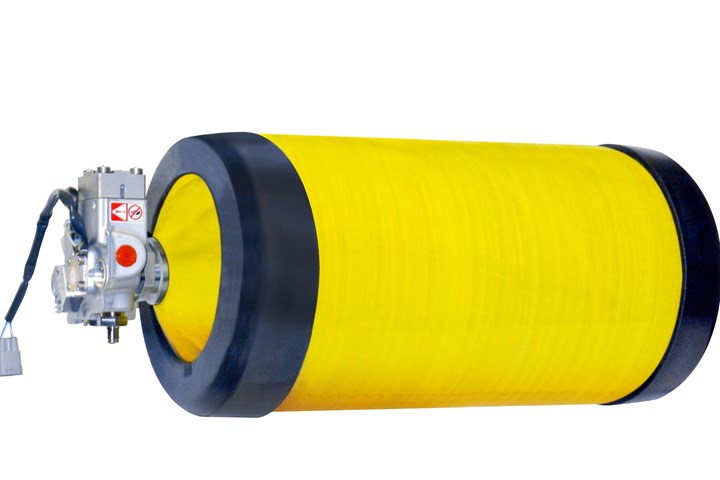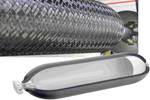Toyota awards Toyoda Gosei for composite hydrogen tank development
CFRP and GFRP tank makes an appearance on the 2021 Toyota Mirai, with a minimized pressure-resistant layer for 10% increased storage and a cruise range extension.

All photo credit: Business Wire
Toyoda Gosei Co. Ltd. (Kiyosu, Japan) has received the Technology & Development Award from Toyota Motor Corp. (Toyota, Japan) for the development of composite high pressure hydrogen tanks used on the new 2021 Toyota Mirai fuel cell vehicle (FCV), launched by Toyota in December 2020.
According to Toyoda Gosei, high pressure hydrogen tanks are a crucial component for FCVs, which efficiently hold hydrogen compressed at high pressure (about 700 atm). The Mirai is specifically equipped with three hydrogen tanks, one more than the previous model to extend its cruising range.
The addition of the third tank — located at the rear of the vehicle — was developed by Toyoda Gosei in collaboration with Toyota and was produced at the company’s Inabe plant in Japan beginning in November 2020. For the new tanks, improvements were reportedly made in the materials used in the carbon fiber-reinforced plastic layer, one of the three layers of the tank wall (layered to withstand high pressure), production methods and other factors. As a result, says Toyoda Gosei, the hydrogen storage efficiency of the tank, which is the ratio of the mass of stored hydrogen to the mass of the tank, was increased about 10% by minimizing wall thickness to increase the inner volume while maintaining the pressure resistance strength.

Toyoda Gosei adds that it will continue to develop products leveraging its core rubber and plastic technologies with the aim of supporting the spread of electrified vehicles such as electric vehicles (EV) and FCVs.
Related Content
-
Automotive chassis components lighten up with composites
Composite and hybrid components reduce mass, increase functionality on electric and conventional passenger vehicles.
-
Robotized system makes overmolding mobile, flexible
Anybrid’s ROBIN demonstrates inline/offline functionalization of profiles, 3D-printed panels and bio-based materials for more efficient, sustainable composite parts.
-
Real-time assessment of thermoset composites curing
The combination of material state management (MSM) software and an encapsulated sample rheometer (ESR) enables real-time cure recipe management or cure model development inside the autoclave.













